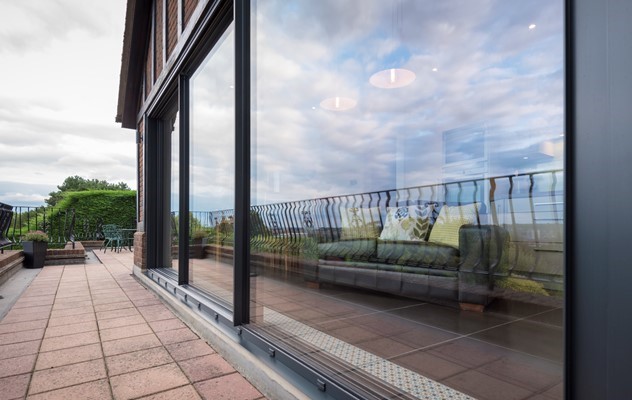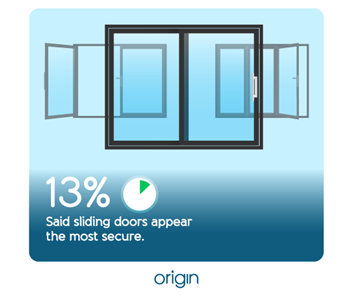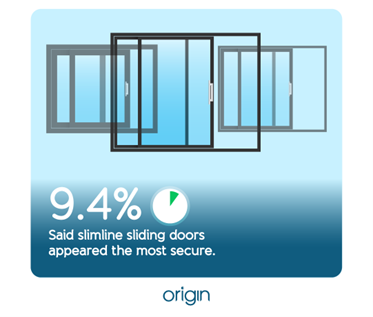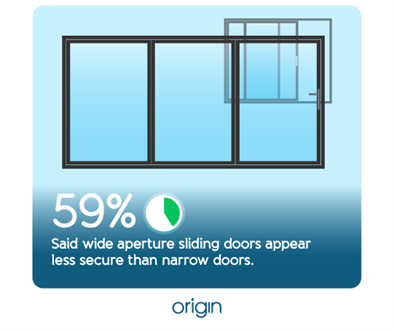When you make a home renovation, you never want to compromise on either style or functionality - the same is true for patio door security. According to British homeowners, a secure patio door is a crucial priority - ranking 9/10 on average (Origin, 2024).
Robust security is essential, but you’ll also want to ensure it looks are tailored to your requirements. Can you have a stunning, seamless glass door that also stands up to rigorous security standards? At Origin, we test all our doors against common intrusion techniques to ensure you stay safe in your home.

Sliding doors are an excellent choice for opening up your space to the outdoors. They usually have wide apertures and minimal sightlines, which drench your interior space in mood-boosting natural light. However, these doors can have a negative reputation for being less secure than other types of patio doors. This is because older designs can potentially pose a security risk.
Additionally, because sliding doors can support larger glass panels than typical hinged doors, they can also appear less secure. This is because they typically have slimmer sightlines or frames than other door styles. Although owing to this, they help create the most seamless view of your garden. Here, we explore the security information associated with Origin’s Slimline Sliding Door - OS29+.
In this guide:
French doors were perceived as the most secure. Can you predict which was the least?
Understand how our slimline sliding doors don’t compromise on security
Learn how large pages of glass affect the perceived security of patio doors
Use more sliding glass door panels to feel safer at home
Which type of patio door is the most secure?
The most popular styles of patio door include French Doors, Sliding Doors and Bifold Doors. French Doors have two doors with handles and a locking mechanism in the centre. Sliding doors have multiple panels which slide and open along a track using door rollers. External bifold doors are made up of separate door leaves and have several sets of hinges, located between each pane, which allow it to concertina open.

We asked British homeowners which doors appeared the most secure and 50% chose French doors, 36.5% chose bifold doors and 13% selected sliding doors as the most secure (Origin, 2024). Misconceptions about the security of sliding doors could have contributed to these results, but they also typically have slimmer frames compared to other door options which could make them appear less secure.

"We could not be happier with the finished project, and we cannot thank Freedom Bespoke & Origin enough for their hardwork and attention to detail!"
- The Homeowners
Unlike traditional sliding doors, Origin’s slimline sliding door - the OS29+ - features multi-point locking systems, concealed tracks and has the option of having no handle on the outside, which means it can’t be picked by an intruder. Individual sliding door sashes can be up to 6m2, and you can work with your chosen installer to have laminated, toughened or solar-reflective glass for a higher level of security and exceptional energy efficiency. In fact, the OS29+ Sliding Door can achieve a market-leading U-Value (as low as 0.78W/m2K).
You can benefit from the most uninterrupted views of the outdoors with Origin slimline doors and this offers excellent security for your home.
Are doors with slim sightlines less secure?
Find your local installer today to bring your vision to life
On a similar note, slimmer sightlines could appear less robust than wider aluminium frames. Our cohort agreed. We showed three doors with different sightline widths and you perceived the widest frame as the most secure. The slimmest frames were viewed as the least secure (Origin, 2024).

Although a wider sightline creates the illusion of extra security, our slimline aluminium doors are just as robust as the wider designs. We use the highest quality aluminium, which is extremely durable and engineered for optimal strength and security. Regardless of sightline chosen, our aluminium sliding doors offer better thermal efficiency when compared to wood or uPVC.
Slimmer sightlines provide a striking vista because they’re minimally obtrusive and let more light flood into your home, so you can choose it with confidence.
Wide or narrow - Which sliding doors are more secure?
Your home’s layout dictates the possible aperture size of your patio door. Bigger homes may be able to achieve a larger patio door to flood the whole room with light. Meanwhile, smaller rooms may not be able to accommodate a wide opening. Regardless, the survey respondents felt that larger sliding door sets were at a greater security risk (Origin, 2024).
While large glass panels create panoramic views, they can make your home feel more exposed at night. However, the OS29+ has safety features such as a multipoint lock and can be specified with various types of glass, such as solar-reflective, toughened or laminated triple glazing, to further enhance its security. Your chosen installation partner will be responsible for sourcing the glazing, so please speak to them for more details.

Have peace of mind that even wide glass patio doors offer a robust security system. For even more reassurance, at Origin, you’ll benefit from a guarantee of up to 20-years.

View the coastal home sliding door case study
Is it better to have more sliding door panels?
Having a greater number of narrower glass panels as opposed to a smaller number of large panels was also believed to be more secure (Origin, 2024). Similar as to why smaller door sets give the impression of safety, the more panels you use (e.g., three narrow panes as opposed to two wide panes), the higher your frame-to-glass ratio. However, Origin Sliding Doors can accommodate lots of durable glazing options, which can offer peace of mind no matter how expansive the glass.
At Origin, you can configure your door panels exactly to your liking - use fewer wide panels or numerous narrow panels. The more sliding door panels you have, the lighter the weight of each sash. On the other hand, the fewer panels you use, the more seamless your outdoor view will be.
Origin Doors are bespoke to you. Select your desired size, configuration, colour (over 150 RAL colours and different finishes available) style and hardware options. What’s more, our latest collection of Sliding Doors are designed to far exceed the current and future UK U-Value requirements and offer the lowest on the market (2025). This helps keep your heating bills down while maximising natural light flow.
Explore our Slimline OS29+ Collection or find your local installer
Frequently Asked Questions
Which patio door is the most secure, Sliding, bifold or French doors?
Sliding doors open along a track instead of swinging or stacking like French doors or bifold doors, respectively. The locking mechanism is slightly different to hinged doors and they can often accommodate larger glass panels. However, all of Origin’s patio doors have been designed to be ultra-secure and durable.
What are the most common security risks with sliding doors?
A secure sliding door should feature a secure bottom track that prevents the door from being lifted. Modern options usually have multipoint locking systems which should also be non-negotiable, as they are much harder to tamper with or jemmy. Specifiers should also look for systems with 3-star barrels that are anti-bump, drill, pick and snap. First-floor sliding doors should also be specified with toughened glass to add an extra layer of home security.
How can I improve sliding door security?
The best option is to choose sliding doors that have been designed, manufactured and installed with optimal security in mind. However, there are several additional ways to your home safe, such as adding blinds or security film.
Are balcony sliding doors secure?
Sliding doors on a balcony are usually harder to access than first-floor doors, so they don’t require toughened glass as part of building regulations. However, it’s advisable to look for key security features such as multipoint locks. For additional peace of mind, you can ask your installer for safety glass for greater peace of mind.
































